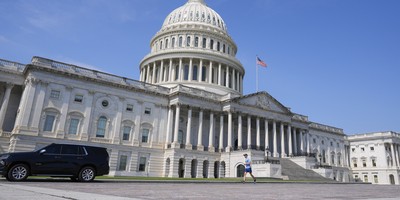If there remained any doubts that academia is among the most thoughtless places in the cosmos, the University of New Hampshire just put them to rest once and for all.
The breathtaking Political Correctness embodied by UNH’s recently released, “Bias-Free Language Guide” (BFLG), proves that higher education has become a one-dimensional caricature of itself. Indeed, right-wing reactionaries couldn’t have done a better job in calling attention to the intellectual and moral shallowness, the remarkable lack of seriousness—or is it the remarkable abundance of deadly seriousness?—of academia.
And before anyone objects that the entire academic establishment shouldn’t be judged on the basis of the actions of one school, it should be borne in mind that the zeitgeist expressed by UNH’s latest de facto speech code is one and the same left-wing orthodoxy that has long achieved a stranglehold over the university.
The BFLG “is meant to serve as a starting point” in rethinking “terms related to age, race, class, ethnicity, nationality, gender, ability, sexual orientation and more” for the purpose of promoting “inclusive excellence in our campus community.” In short, words that are infected with “bias” are “problematic” or “outdated;” those that are alleged to be “bias-free” are “preferred.”
“People of advanced age” and “old people” are preferred. Terms like “older people,” “elders,” “seniors,” and “senior citizen” are problematic and outdated.
Recommended
Yes, believe it or not, “‘old people’ has been reclaimed by some older activists who believe the standard wording of old people lacks the stigma of the term ‘advanced age.’” Moreover, the term “old people” also halts “the euphemizing of age.” The latter isbad because in “euphemizing,” we assume that “age is a negative.”
“Poor person” and “person from the ghetto” are problematic and outdated. In contrast, “person who lacks advantages that others have” and “low economic status related to a person’s education, occupation and income” are preferable.
Wow. If “poor person” is now a politically incorrect term, then it would appear that no word is safe.
Indeed: Even use of the word “homeless” reflects insensitivity on the part of the user. The BFLG explains that “homeless” “reduces the person to being defined by their housing rather than as a person first [.]”
Instead, “homeless” should give way to “person-experiencing homelessness.”
“Obese” and “overweight” are offensive descriptors: the former is “the medicalization of size” while the latter is “arbitrary.” Even “fat” is on its way to being preferable to either of these terms, for some “people of size”—the preferred term of choice—and “their allies” have “reclaimed” it.
“Non-disabled” is preferred to “able-bodied” and “normal.”
“Person who is blind/visually impaired” is preferable to “blind person.”
“U.S. citizen” or “resident of the U.S.” is preferable to “American,” for the latter “usually…fails to recognize South America.”
“Foreigners” should be rejected in favor of “international people.”
“Illegal alien” and “illegal” fail to affirm the humanity of those in question. But even “undocumented immigrant or worker,” though generally preferable to the alternative, isn’t wholly successful in recognizing “the person’s humanity first.”
“Sexual preference” is bad because it suggest that “being gay or lesbian is voluntary and therefore ‘curable.’” On the other hand, “sexual orientation” and “sexual identity” are good.
“Homosexual” is out; “gay, lesbian, same gender-loving (SGL)” is in.
Alternative “lifestyle” is unacceptable in that it has been “used by anti-gay extremists to denigrate lesbian, gay, bisexual and transgender lives.” “LGBTQ” is the only appropriate term here.
“Parenting” and “nurturing” are “non-gendered” activities. Thus, only if “gender is specifically implied” is it permissible to use the otherwise problematic terms of “mothering” and “fathering.”
“Opposite sex” is offensive and insensitive. “Other sex” is more inclusive.
These are just some of the revisions to our language that the BFLG suggests. It also identifies a number of “micro-aggressions” like the “micro-assault,” the “micro-insult,” and the “micro-invalidation.” A micro-assault is what the guide refers to as a “verbal attack.” The example used is that of one person who, upon encountering another “using a mobile chair for long distance travel,” questions the latter about his or her ability to walk.
This is a micro-assault.
A micro-insult is “a form of verbal or silent demeaning through insensitive comments or behavior,” and a micro-invalidation consists in “degrading a person’s wholeness through making false assumptions about the other’s ability, causing a sense of invalidation.”
UNH President, Mark W. Huddleston, insists that the BFLG is not school policy. He also claims to be “troubled by many of the things in the language guide, especially the suggestion that the use of the term ‘American’ is misplace or offensive.”
Whether Huddleston is sincere on this score, or whether he realized that the language guide released by the institution over which he presides is getting some bad press—the BFLG, he concedes, is “offensive to many, myself included”—is anyone’s guess. However, given his subsequent comment that “the only NHU policy on speech is that it is free and unfettered on our campus,” Huddleston sounds as self-delusional as the authors of the guide who see their work as an intellectual achievement.
“Universities are places to look at the world in new ways,” they write in their introduction. “As a university organization, we care about the life of the mind.”
As this little guide to “bias-free language” makes clear, this is self-delusion of epic grandeur.
Far from being “places to look at the world in new ways,” universities generally, and, evidently, the University of New Hampshire specifically, encourage students to look at the world in the same, old, unadventurous ways that they have imbibed from the larger culture, a politically correct, left-of-center culture for which most contemporary academics insist upon being apologists.
Maybe UNH really does “care” for “the life of the mind.”
But it cares to dominate and control the minds of its students.
























Join the conversation as a VIP Member